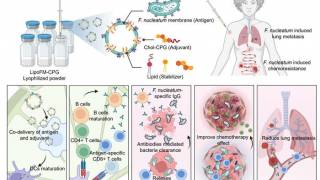Old Vaccine Potentially Treats Liver Cancer

The Bacillus Calmette-Guérin (BCG) vaccine, which has been around for over a century and is known for enhancing the body's immunity against tuberculosis and other diseases, is a potential breakthrough in treating hepatocellular carcinoma (HCC).
HCC is the most common type of liver cancer and the third leading cause of cancer-related deaths globally.
According to the North American Association of Central Cancer Registries, an estimated 41,210 new HCC cases would be diagnosed in the United States in 2023.
A recent study led by UC Davis Health revealed that a single dose of the BCG vaccine significantly reduced liver tumor burden and prolonged the survival of mice with liver cancer.
This groundbreaking study is the first to demonstrate the promising effects of the BCG vaccine in treating liver cancer.
BCG vaccines are derived from the live bacteria Mycobacterium bovis and have been considered safe and widely used worldwide. As of 2024, about 16 versions of the original BCG vaccine are in use.
In the United States, Merck's TICE® BCG vaccine is FDA-approved but is only considered for people who meet specific criteria.
The results of this study, published on February 2, 2024, offer new hope for effective treatment of liver cancer and could potentially save countless lives, wrote these researchers.
Results indicate positive influences on hepatic fibrosis and metabolism, reducing lipid levels.
Spatial analysis underscores BCG's tumor-specific effects, inducing the enrichment of metabolic pathways and inhibiting various cancer-related pathways.
Furthermore, BCG promotes immune cell infiltration, including CD4+, CD8+ T cells, and M1 macrophages, in both v-akt murine thymoma viral oncogene homolog 1(AKT)/neutoblastoma RAS viral oncogene homolog and β-catenin positive HCC models.
Interestingly, blocking T cells, trained immunity, and Interferon-γ function reverses BCG's anti-HCC effects.
"HCC is very difficult to treat. This cancer is considered a cold tumor, which does not respond well to immunotherapy," said Yu-Jui Yvonne Wan, the study's senior author, and vice chair for research in the UC Davis Department of Pathology and Laboratory Medicine, in a press release on February 20, 2024.
"We had a good reason to believe the BCG vaccine could stimulate an immune response. So, we gave a dose of BCG to mice with liver cancer, and our surprise, it was enough to activate the body's immune system and reduce tumor load."
In conclusion, these researchers added that BCG emerged as a promising treatment option for HCC, characterized by a favorable safety profile and efficacy in inhibiting fibrosis, improving metabolism, and engaging trained immunity and T cells in therapeutic mechanisms.
The current treatment options for liver cancer, including surgery, radiotherapy, chemotherapy, immunotherapy, and liver transplant, have poor outcomes.
Our Trust Standards: Medical Advisory Committee
























